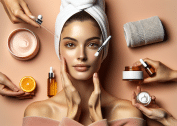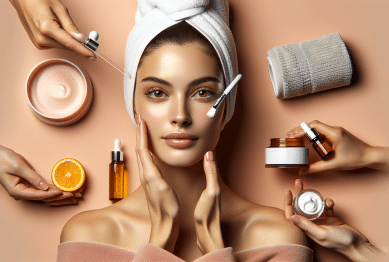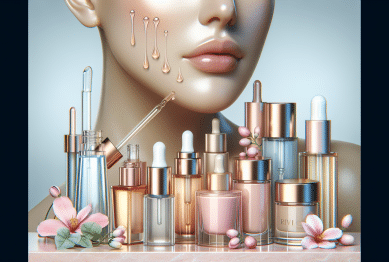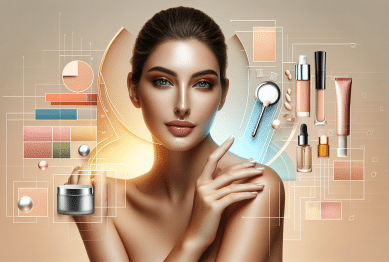Curious about achieving a natural glow? Explore the science behind collagen and its impact on radiant, healthy skin. This engaging guide demystifies collagen’s role, sources, and ways to nurture your beauty from within for long-lasting wellness benefits.
Why Collagen Matters for Skin Wellness
Collagen is more than a buzzword in the beauty world. It is the foundational protein that supports the structure and elasticity of skin, playing a vital role in achieving that coveted radiant appearance. For many, maintaining healthy levels of collagen is closely linked to a youthful look and firmer texture. As age advances, the body begins to produce less of this essential protein, leading to common concerns like fine lines and a loss of skin suppleness. Whether considering creams, supplements, or nourishing foods, understanding collagen’s science reveals how a little focus on this protein can go a long way toward improved skin health.
Collagen production involves a complex interaction between amino acids, vitamins, and minerals. Vitamin C, in particular, is essential for collagen synthesis because it assists in the binding of these amino acids. Lifestyle choices and exposures—like UV light, pollution, and even stress—can accelerate the breakdown of collagen, leaving the skin weaker and prone to premature aging. That’s why many wellness experts emphasize a holistic approach: supporting collagen from both inside and out, through balanced nutrition and consistent skincare habits. For many individuals seeking holistic skin health, starting with these basics often brings noticeable improvements over time.
Exploring collagen doesn’t mean looking for miracle fixes. Instead, it’s about making informed choices that honor your body’s natural processes. Practical strategies include maintaining hydration, protecting your skin from excessive sun, and including collagen-supportive nutrients in your daily meals. Some also turn to topical peptides and formulated products, though their impact varies. Research suggests results are often best when dietary and topical strategies are combined. Ultimately, a solid understanding of collagen helps simplify the journey toward more resilient, luminous skin.
How Nutrition Supports Collagen in the Body
Nourishing your skin from within is a foundational principle in the world of wellness. Nutrients like vitamin C, zinc, and amino acids lay the groundwork for the body to build collagen efficiently. Eating a diet rich in colorful fruits and vegetables, along with lean proteins, can provide these essential building blocks. Citrus fruits, berries, leafy greens, and eggs are just a few natural sources that nurture the body’s internal collagen network, empowering brighter, plumper skin without relying solely on topical products.
Recent studies highlight the synergy between nutrition and beauty. Diets that focus on antioxidants, omega-3 fatty acids, and a variety of phytonutrients are linked with fewer visible signs of aging. For example, omega-3s found in flaxseed and walnuts help reinforce the skin barrier, shielding collagen stores from oxidative stress. Even drinking enough water plays a role—well-hydrated skin is less prone to fine lines and sagging, and a diverse, balanced diet helps prevent the nutrient deficiencies that would otherwise disrupt natural collagen production.
Poor dietary choices, on the other hand, can take a toll. Excessive sugar, processed foods, and alcohol are known culprits for glycation, a process that damages collagen and accelerates the skin’s aging process. By prioritizing fresh foods and mindful eating, you set the stage for long-lasting wellness and bring out your skin’s most radiant qualities. Combining nutrition with smart skincare completes a powerful approach to beauty that stands the test of time.
The Truth About Collagen Supplements and Powders
Collagen supplements—usually derived from marine or bovine sources—have gained popularity among beauty enthusiasts and wellness seekers alike. These powders and capsules are often promoted as a simple way to restore your skin’s youthful glow. While some users report more hydrated, firmer skin after consistent supplement use, scientific evidence suggests that results depend heavily on lifestyle, genetics, and overall nutrition. Not every supplement will deliver the same outcome, and absorption rates can vary.
Hydrolyzed collagen, which is broken down for easier absorption, is the most common form in these products. Research indicates that it can be incorporated into the skin’s underlying matrix, supporting elasticity and moisture retention. However, experts caution against relying solely on supplements; they should be used to complement, not replace, good nutrition and daily sun protection. Individuals with allergies or dietary restrictions should also review ingredient lists and consult with qualified healthcare practitioners before starting any supplement regimen.
Transparency is key to choosing a high-quality collagen supplement. Third-party certifications, clear ingredient sourcing, and minimal additives are markers of reputable products. It’s also helpful to set realistic expectations. No supplement can serve as a single solution for skin concerns, but when integrated thoughtfully into a holistic approach, collagen powders and capsules may work alongside diet and skincare to encourage a more luminous complexion over time.
Lifestyle Choices That Protect and Preserve Collagen
Daily habits can make all the difference in maintaining collagen integrity. One of the most effective protective measures is regular use of sunscreen, which shields against the damaging effects of UV radiation—a top contributor to collagen breakdown. Wearing hats and seeking shade further reduce exposure. Establishing a consistent skincare routine that includes gentle cleansing and moisturization is equally vital, as harsh chemicals or aggressive scrubbing can compromise the delicate collagen matrix.
Stress management may be less obvious but is just as important for collagen preservation. Elevated cortisol levels, often triggered by chronic stress, can lead to disrupted sleep and hinder the body’s ability to repair and build collagen. Practices like meditation, yoga, and regular exercise have been linked with lower stress hormones and improved overall skin quality. Even something as simple as prioritizing sleep helps the skin repair itself overnight, maximizing natural collagen synthesis.
Avoiding environmental hazards is another key step in defending collagen. Exposure to air pollution, tobacco smoke, and free radicals creates oxidative stress that weakens collagen fibers. Incorporating antioxidants through both diet and topical application creates an extra layer of defense, keeping skin looking and feeling smoother for longer. When lifestyle and environmental factors align, the benefits for your skin’s resilience and glow become clear.
Exploring Professional Treatments for Collagen Renewal
Professional skincare options can help boost natural collagen levels when diet and daily habits need an extra push. Treatments such as microneedling, laser therapy, and certain peels are clinically proven to stimulate the skin’s own repair process, prompting the production of fresh collagen. These procedures often carry less downtime and can target specific areas, making them popular choices among those eager for visible results without extensive intervention.
Each treatment comes with its own set of considerations, from cost to possible side effects. Consulting with a board-certified dermatologist or licensed aesthetician helps ensure that the chosen method aligns with individual skin needs and health status. Applications like microcurrent facials or LED light therapy offer gentler stimulation for those seeking less invasive options, helping to enhance skin tone and firmness over time.
Though in-office procedures can deliver noticeable boosts, they work most effectively alongside daily wellness practices. Using antioxidant-rich serums, nurturing hydration, and adopting a sun protection routine all support the work of professional treatments. Visible improvements often result when these elements combine for a balanced, patient approach to long-term skin wellness and beauty.
Building an Everyday Routine for Radiant, Youthful Skin
Consistency is the quiet power behind all things beauty and wellness. An everyday routine built around collagen-friendly habits can transform skin’s texture and tone over time. This means gentle cleansing, adequate hydration, and nourishing with skincare ingredients known to fortify collagen—like peptides, vitamin C, and hyaluronic acid. Sun protection, as always, should be a non-negotiable step each morning regardless of the weather.
Pairing a consistent topical regimen with healthy eating sets the foundation for natural radiance. Morning and evening routines that target both prevention and repair give skin its best chance to thrive. Nighttime is especially important, as the body repairs cellular damage and builds fresh collagen while you sleep. Many wellness experts recommend listening to your skin and adjusting routines seasonally or as needs change.
Embracing this sustained, balanced approach means results may arrive gradually but remain long-lasting. Glowing skin often reflects inner health, so supporting collagen through nutrition, lifestyle, and self-care offers benefits that go beyond surface appearance. With patience and informed choices, vibrant, youthful skin can be a lasting part of your wellness story.
References
1. Harvard Health Publishing. (n.d.). Collagen: What is it and what are its uses? Retrieved from https://www.health.harvard.edu/staying-healthy/collagen-what-it-is-and-what-it-does
2. Cleveland Clinic. (n.d.). What is Collagen? Retrieved from https://my.clevelandclinic.org/health/articles/23089-collagen
3. Mayo Clinic. (n.d.). Collagen and skincare: What the science says. Retrieved from https://www.mayoclinic.org/healthy-lifestyle/adult-health/expert-answers/collagen-supplements/faq-20496418
4. National Institutes of Health. (n.d.). Dietary Supplements: Fact Sheet for Consumers. Retrieved from https://ods.od.nih.gov/factsheets/Collagen-Consumer/
5. American Academy of Dermatology Association. (n.d.). Skin care and aging. Retrieved from https://www.aad.org/public/everyday-care/skin-care-basics/aging/skin-care-and-aging
6. Linus Pauling Institute, Oregon State University. (n.d.). Vitamin C and Skin Health. Retrieved from https://lpi.oregonstate.edu/mic/health-disease/skin-health/vitamin-C









